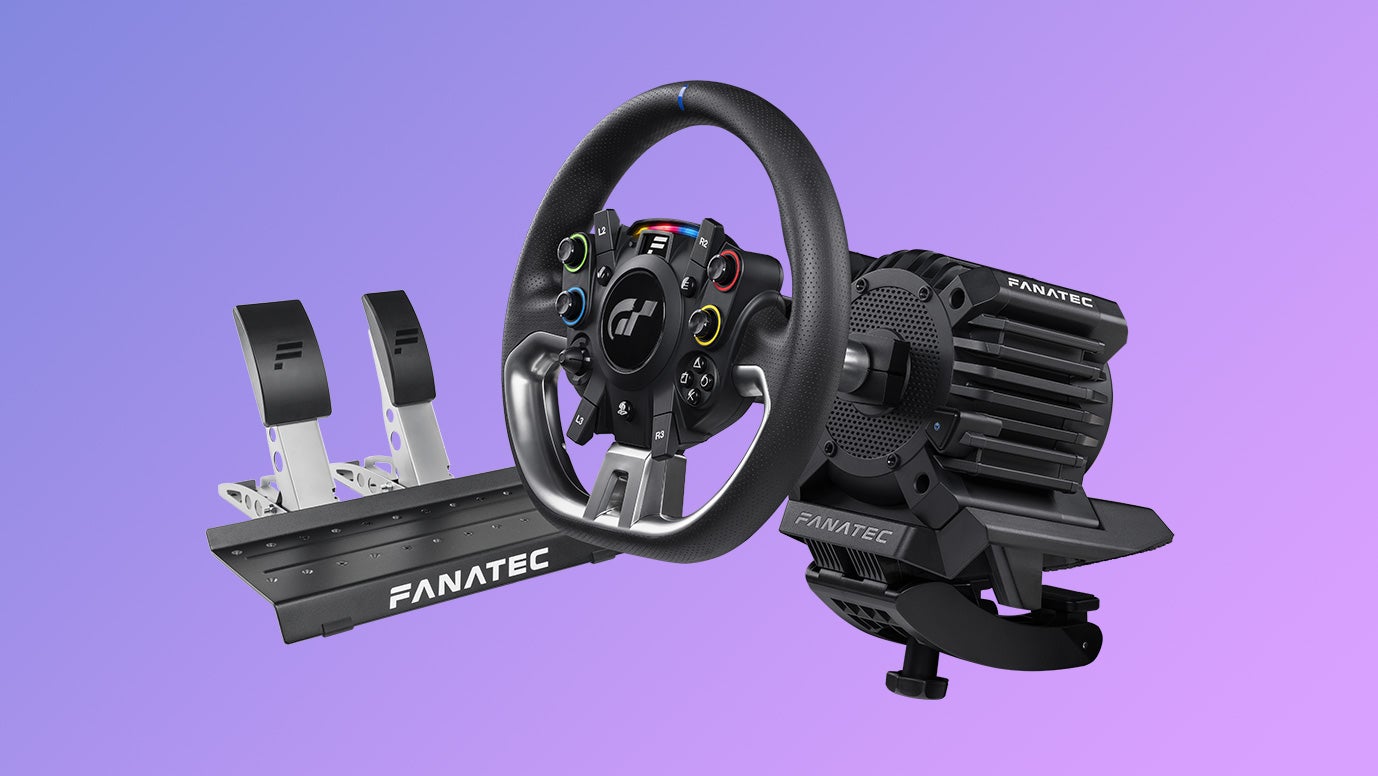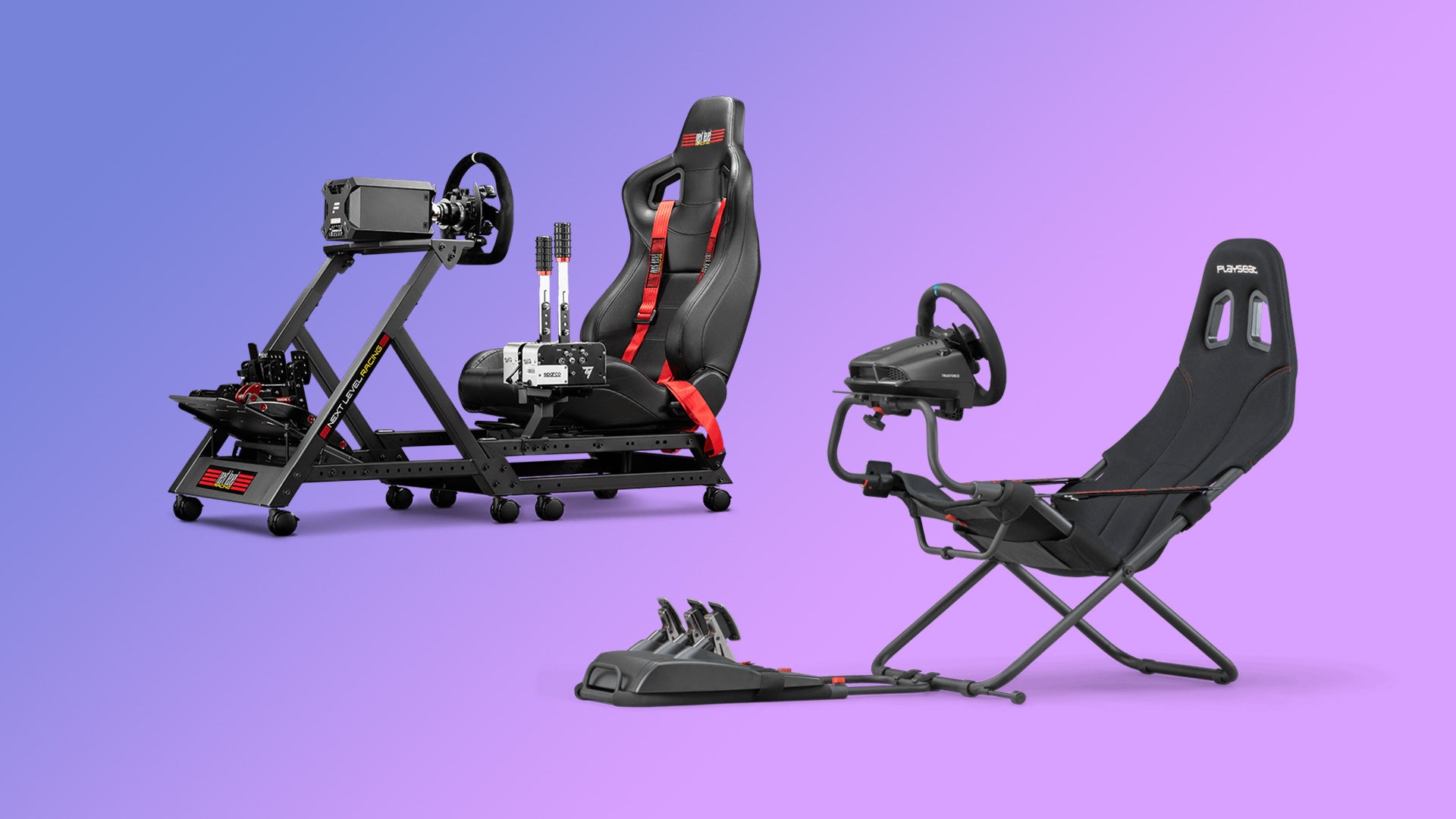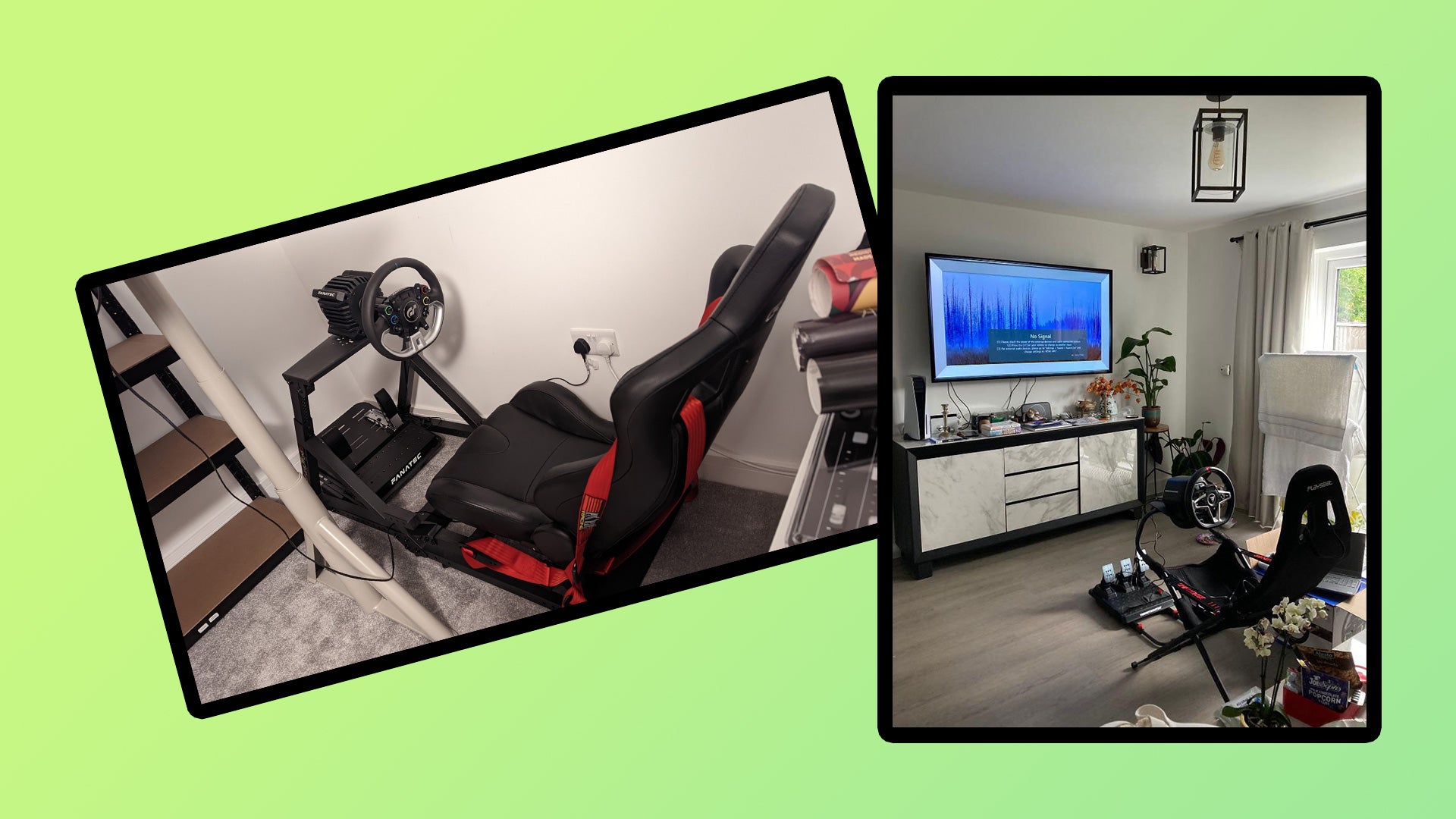These days, I live on another continent to the house I grew up in, I write about playing computer games for a living and everything seems to be going a bit mad in the world - but I still meet up with my brother to play racing games. But instead of crowding around the family computer, waiting for the CD drive to spool up and load the next level, we play on a modern game console with the sort of photorealistic graphics that Need for Speed 2 has in my memory… but definitely doesn’t if I go back to check.
The release of Gran Turismo 7 - and the unprecedented excitement of Formula 1’s 2021 season - made me want to take things a bit more seriously. So earlier this year, I ordered Fanatec’s DD GT Pro, a wheel-and-pedals set built around a modestly powerful but nonetheless fancy direct drive system that’s meant to offer more detailed and realistic force feedback than cheaper belt-driven wheels.
There are only two pedals, and no shifter, but the level of realism it instantly provides is immense - especially compared to the $20 wheel I used for an ancient MotoGP game as a kid, and only slightly less flimsy Logitech wheel my uni housemates played Gran Turismo 5 on. Suddenly, this feels like real racing - the only problem is that mounting the wheel to a desk and setting your ‘racing-style’ chair to its lowest setting leaves you in a seriously uncomfortable position. My feet, already painful and inflexible on the best days thanks to a quartet of childhood surgeries, started cramping before I’d reached the corkscrew at Laguna Seca. I knew at that point that I had to go the whole hog… and pick up a proper racing seat to mount all of this fancy kit on.
My research identified two potential candidates from the surprisingly crowded ‘simulation-style-racing-cockpit’ market: a £180 foldable unit called the PlaySeat Challenge and a £645 metal cockpit called the Next Level Racing GTtrack. The PlaySeat would take up far less space, folding away under a desk, but the GTtrack would offer more stability and adjustability. I couldn’t decide between them, so I put out some feelers and tried to find out if either company would send me one to test out.
To my immense confusion and surprise, both companies did, thanks to the efforts of a former colleague in British retailer Box’s marketing department. The PlaySeat was a simple enough delivery, arriving via one of the usual couriers, but the Racing Extreme Pro was something else, turning up on a pallet and requiring significant effort to drag it into the living room. I spent two or three happy hours setting it up - thankfully, all of the instructions made sense and most bits were secured together with reassuringly chunky metal bolts - and then spent another half hour attaching the wheel and pedals, of course requiring me to get the wheel-and-pedals box out of the shed to retrieve some bit or another that I had thought I’d never need. This complete, I booted up GT7 for my first proper go on the wheel.
It was bloody brilliant. The seat’s more reclined racing position immediately made things radically more comfortable, and the included seatbelt (!!) provided both unparalleled levels of immersion and a (strictly enforced) ergonomic advantage. The wheel was a bit too high at first, and the pedals too close, but within a few goes (and with a few sets of bolts pulled out and replaced), I had a setup that felt as nearly as comfortable to drive in as my actual (13-year-old) road car.
There are two big advantages of a proper racing setup like this compared to driving with a controller (or indeed a keyboard, as I’ve done for most of my time ‘racing’). The first is that you feel a lot more connected to the road - the vibration of the steering wheel gives you a great sense of the available grip, letting you know when you can push harder or where you’re just on the edge of losing traction. There’s certainly a period of adjustment from gamepads, where you end up being much slower overall because you’re unfamiliar with the equipment, but in theory the ‘skill ceiling’ ought to be much higher on a setup like this; you ought to be able to eventually produce better and more consistent laptimes as you have access to more information.
The second major advantage is that you just feel really cool the whole time you’re doing it. Okay, you may not feel cool when you’re unstrapping yourself out of a virtual endurance race, dripping with sweat, having achieved nothing more than a bit of virtual currency in your racing fantasy of choice, but the moment-to-moment action of driving a car around a track with a wheel and pedals just feels really fun. Similarly, when people come to visit your office and see a racing setup, they’re full of questions and want to have a go - which is brilliant! Racing is one of the few genres that, mirroring its real-life analogue as closely as it does, you don’t need any gaming experience to try out and even enjoy.
The major downside to having a big-ol’ racing setup in your office - beyond the obvious distractions it provides - is that it takes up a heck of a lot of space. I’m lucky enough to have a decent-sized room at my house for an office, but I didn’t realise how awkward it would be to squeeze a 138cm long, 120cm tall and 55cm wide cockpit amongst my existing shelves, desks and gaming chairs. I kind of supposed that I could slide it under a desk or something, but the relatively tall chair and the elevated wheel mean there are two ‘high points’ here; you can slide it under a standing desk, but there’s no chance of sliding it under a desk you intend to sit at. The GTtrack does come with wheels - and slides on carpet well enough without them - but it’s heavy enough that moving it isn’t something you can do conveniently multiple times a day.
Of course, that brings us to the PlaySeat Challenge - which costs much less, but ended up fitting into my life a whole lot better. The idea here is that the whole thing folds up, so you can stash it under a desk or just against a wall. I was worried that it would be a bit unstable with everything fitted, but I think the 5Nm of torque that the GT DD Pro provides out-of-the-box (and the weight of the unit) is just enough to be handled by the seat without feeling completely unstable.
The Challenge is actually quite comfortable once you’re in it, with a relatively airy design that keeps you cool during the summer, and there are some nice touches here - like a stablising leg that prevents the chair from tipping over when you rotate the wheel support out of the way to stand up or sit down. You do feel a bit confined, and the level of adjustability isn’t anywhere like the GTtrack, but it’s perfect if you don’t have a permanent gaming area as you can leave all of your kit installed on it, and just fold it away when you’re done playing. You can even do things like bring it downstairs to play on the big TV, or even to a friend’s house, that simply aren’t practicable with the larger racing cockpit.
Again, I think this speaks to the social aspect of racing that is important to me; it’s fun to race and improve, but even more fun to introduce the idea of sim racing to your friends and family and laugh with them as everything goes inevitably pearshaped.
So that’s where I am at the moment - having a lovely time playing F1 22 and Gran Turismo 7 with the Fanatec GT DD Pro and Next Level Racing GTtrack (that I’ve rearranged my entire office to accommodate), and loaning the PlaySeat Challenge to my neighbour for his own GT efforts. The simulator is always a point of interest for office visitors, and having people give it a go has lead to some brilliant moments.
I’d like to continue evolving the setup over time - perhaps a load cell brake pedal, a monitor mount, a fancier carbon fibre wheel, a shifter? - but I’m going to enjoy what I have for now. This is one of those hobbies that you can very easily sink a ton of money into, and just having a comfy wheel, pedals and seat that I can share with my friends and family is already a childhood dream come true.


